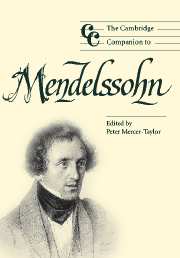Book contents
- Frontmatter
- Introduction: Mendelssohn as border-dweller
- Part I Issues in biography
- Part II Situating the compositions
- Part III Profiles of the music
- 6 Symphony and overture
- 7 The works for solo instrument(s) and orchestra
- 8 Mendelssohn's chamber music
- 9 The music for keyboard
- 10 On Mendelssohn's sacred music, real and imaginary
- 11 Mendelssohn's songs
- 12 Felix Mendelssohn's dramatic compositions: from Liederspiel to Lorelei
- Part IV Reception and performance
- Notes
- Select bibliography
- Index
10 - On Mendelssohn's sacred music, real and imaginary
from Part III - Profiles of the music
Published online by Cambridge University Press: 28 September 2011
- Frontmatter
- Introduction: Mendelssohn as border-dweller
- Part I Issues in biography
- Part II Situating the compositions
- Part III Profiles of the music
- 6 Symphony and overture
- 7 The works for solo instrument(s) and orchestra
- 8 Mendelssohn's chamber music
- 9 The music for keyboard
- 10 On Mendelssohn's sacred music, real and imaginary
- 11 Mendelssohn's songs
- 12 Felix Mendelssohn's dramatic compositions: from Liederspiel to Lorelei
- Part IV Reception and performance
- Notes
- Select bibliography
- Index
Summary
Though scholarship is generally agreed about the prominent position in Felix Mendelssohn Bartholdy's oeuvre of sacred music, how to assess its role for his identity as a composer has generated contrasting lines of inquiry. We shall begin by briefly considering the dynamic of religion in the composer's family, and then propose some ways in which the dynamic played out in his sacred choral and chorale-related works.
As the grandson of the leading Jewish philosopher of the Aufkärung, Moses Mendelssohn, Felix was of course mindful of his Judaic roots, which encouraged some scholars to search for Jewish influences in his music. As early as 1867, Camille Selden assumed that Felix had frequented a synagogue and was well versed in Hebrew; two years later, Hippolyte Barbedette was able to hear in the composer's music echoes of Jewish psalmody. In 1880, Sir George Grove, whose pioneering encyclopedia article set the foundation for modern Mendelssohn research, assessed his setting of Psalm 114 op. 51 (“When Israel out of Egypt came,” 1839) thus: “The Jewish blood of Mendelssohn must surely for once have beat fiercely over this picture of the great triumph of his forefathers, and it is only the plain truth to say that in directness and force his music is a perfect match for the splendid words of the unknown Psalmist.” More focused attempts to trace Jewish elements in Mendelssohn's music ensued in the second half of the twentieth century.
- Type
- Chapter
- Information
- The Cambridge Companion to Mendelssohn , pp. 167 - 188Publisher: Cambridge University PressPrint publication year: 2004



